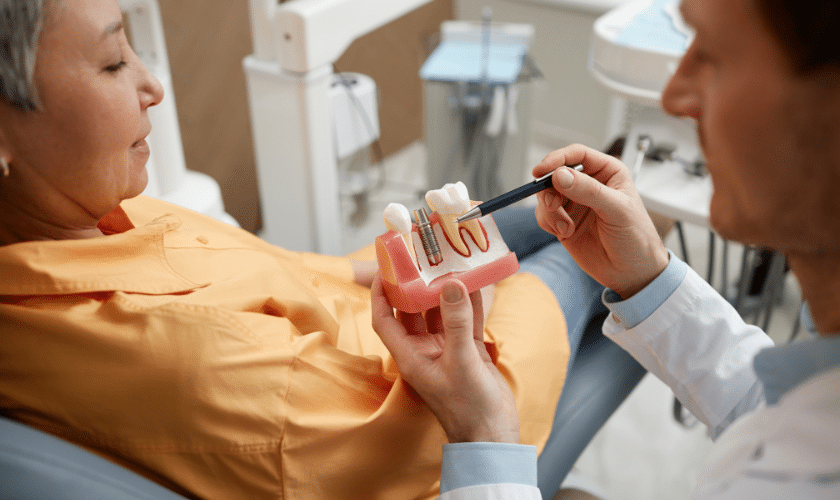Dental Implant Aftercare: Dental implants are a significant investment in your oral health and appearance. Proper aftercare is crucial to ensure your dental implants remain healthy and functional for years. Here’s everything you need to know about taking care of your dental implants and enjoying long-lasting results.
Understanding Dental Implants
Dental implants are artificial tooth roots, usually titanium, that provide a permanent base for fixed or removable replacement teeth. They are a popular option for people who have lost one or more teeth due to injury, periodontal disease, or other reasons. The success of dental implants depends not only on the dentist’s skill but also on the care you take post-surgery.
Immediate Post-Surgery Care
First 24 Hours
The initial 24 hours after your dental implant surgery are crucial. During this period, follow your dentist’s instructions carefully to avoid complications. You might experience some swelling, discomfort, and minor bleeding. These are normal and should subside within a few days. Apply an ice pack to the affected area for 20 minutes to manage swelling. Use over-the-counter pain medication as recommended by your dentist.
Diet and Hydration
Stick to a soft food diet for the first few days. Avoid hot, spicy, and hard foods irritating the surgical site. Good options include yogurt, mashed potatoes, and smoothies. Also, drink plenty of water to stay hydrated, but avoid using a straw, as the suction can dislodge the blood clot and affect healing.
Maintaining Oral Hygiene
Brushing and Flossing
Good oral hygiene is essential to prevent infections and ensure the longevity of your dental implants. Brush your teeth gently twice a day with a soft-bristled toothbrush. Use non-abrasive toothpaste to avoid irritating the implant site. Floss daily using a floss designed for dental implants or a water flosser to remove plaque and food particles.
Mouth Rinse
Using an antimicrobial mouth rinse can help keep the surgical area clean. Your dentist might recommend a specific mouthwash. Avoid alcohol-based rinses as they can cause dryness and irritation. Instead, opt for a rinse that promotes healing and keeps your mouth fresh.
Regular Dental Check-ups
Importance of Follow-ups
Regular dental visits are vital for monitoring the health of your implants. Schedule follow-up appointments as your dentist advises. During these visits, your dentist will check the implants for stability, examine the gums, and ensure no signs of infection or other issues.
Professional Cleaning
Professional cleaning by your dentist or dental hygienist is essential. They have the tools and expertise to clean areas you might miss. Regular cleanings help maintain the health of your gums and implants, preventing peri-implantitis, a condition similar to gum disease that can affect implants.
Lifestyle Adjustments
Smoking and Alcohol
Smoking can significantly affect the healing process and increase the risk of implant failure. If you smoke, it’s highly recommended to quit. Similarly, limit alcohol consumption as it can interfere with healing and overall oral health.
Diet for Healthy Gums
A balanced diet rich in vitamins and minerals supports gum health and overall well-being. Incorporate foods high in calcium, vitamin C, and vitamin D, such as dairy products, leafy greens, and citrus fruits. These nutrients help maintain strong bones and healthy gums, providing a solid foundation for your implants.
Managing Complications
Recognizing Signs of Trouble
While dental implants have a high success rate, complications can occur. Be aware of signs like prolonged pain, swelling, or redness around the implant site. If you notice any of these symptoms, contact your dentist immediately for an evaluation.
Addressing Issues Early
Early detection and treatment of any issues are crucial. Ignoring problems can lead to more severe complications, potentially jeopardizing the success of your implants. Regular check-ups and good oral hygiene are your best defense against implant failure.
The Role of Your Dentist
Personalized Care
Your dentist plays a pivotal role in the success of your dental implants. They provide personalized care tailored to your specific needs and monitor your progress. Follow their advice and recommendations closely to ensure the best outcome.
Long-term Relationship
Building a long-term relationship with your dentist is beneficial. They become familiar with your oral health history and can provide consistent care. Regular visits and open communication help address any concerns promptly and keep your implants in excellent condition.
Taking care of your dental implants is an ongoing process that requires diligence and commitment. By following these aftercare tips and working closely with your dentist, you can enjoy a healthy, beautiful smile for years. For residents in Oak Park seeking comprehensive dental care, visiting a dentist in Oak Park can ensure that you receive the best possible care for your implants. Investing in proper aftercare today means enjoying the lasting benefits of your dental implants for a lifetime.

